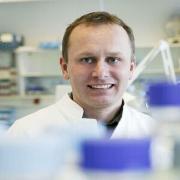Claus tells us about the course: Advanced Biotechnology and Intellectual Property Rights.
Biotech skills in the innovation process
The course Advanced Biotechnology and Intellectual Property Rights is process-oriented and thus different from the courses that students typically encounter on the Master’s degree in Biology and Biotechnology. Here, the students use their biotechnology skills in a focused innovation process where they develop a professional and sound solution to a problem presented by an external partner. It is the external partner, that presents the challenge to the students, as well as provide coaching and feedback to the students during the course.
As part of the course, the students have to ensure that their solutions do not violate existing patents. At the same time they have to ensure the probability of their solution and that it can create economic value for the company. During the course the students will present their solutions in front of the external partners.
Business simulation and divergent thinking challenges the students
The innovation approach on the course is business simulation. The company expresses innovation needs to the students and the students then work on solutions with professional input from UCPH advisers and other experts. Claus Bøttcher Jørgensen says:
“I work with both basic science and applied research. It is very motivating to see that one’s research creates value for others. Cooperation with companies in my teaching contributes with both qualification and implementation of research. ”
There are six permanent academic staff involved in teaching and they contribute to teaching/guidance within their specific disciplines. In addition, there is a DVIP (adjunct associate professor) as a lecturer in patent matters. In a series of workshops, the groups work with:
1) Classification of projects;
2) State-of-the-art;
3) Patents;
4) Project Plan;
5) Financing;
6) Pitch presentation.
In the beginning of the course there is a high degree of divergent thinking, which is a challenge for the students. Claus Bøttcher Jørgensen explains: “The groups are looking at state-of-the-art and feel very frustrated that all of their ideas have been tried before. Through dialogue with the companies and supervisors the groups begin to become more specific in their approach, and then continue working to qualify their proposed solutions.”
The business simulation innovation processes support the academic goals of the course. An important element of the course is the students’ continued status seminars (typically every two weeks) and of particular importance is the presentation to the company. The groups submit a business plan in the 7th week of the course and an approved business plan is a prerequisite for access to the oral exam. At the individual oral exam, students present a 5-minute pitch and then there is a 20-minute discussion on both biotechnology and patent issues.
